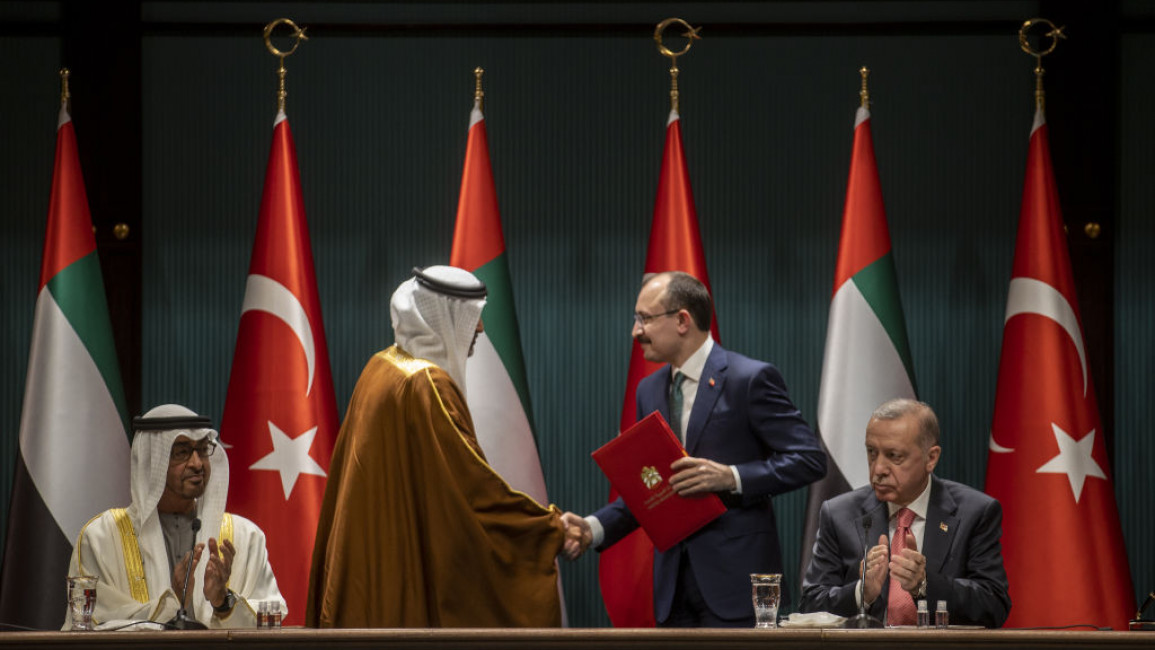
Wooing friend and foe, UAE pursues a brutal version of Turkey's old 'zero-problem' foreign policy
Sheikh Mohammad bin Zayed al-Nahyan (MbZ), the crown prince of Abu Dhabi and de facto ruler of the UAE, last week visited Turkey for the first time in almost a decade, heralding a thawing in relations between the two countries.
For the past decade, with the outbreak of the Arab spring, Turkey and the UAE have found themselves locked in a bitter rivalry throughout the Middle East and North African region. Turkey under the leadership of Erdogan has tended to support forces in the region roughly associated with Islamic democracy, against the old regional order of autocracy and tyranny that the UAE represents.
The antagonistic dynamic between the two occurred mostly on a low level, best encapsulated by matters such as Turkey's support for the democratic government in Egypt, contrasted with UAE's active support for its brutal overthrow and replacement with the totalitarian regime of Sisi.
"Though apologists for both the UAE and the Erdogan government will no doubt celebrate this as a breakthrough for 'peace', 'pragmatism' and 'diplomacy', the reality is that it is yet another victory for the UAE's vision of a world of hyper-exploitative avarice"
But as the UAE, along with Saudi, began to form an expansive counterrevolutionary bloc, tensions with Turkey heightened. This led to several high-profile showdowns, including Turkish troops being sent to help Qatar against Saudi-UAE aggression and, earlier this year, Turkey intervening in Libya to stop a UAE-backed fascist coup against the UN-recognised democratic government in Tripoli.
In Syria, the UAE has become the vanguard of attempts to reintegrate Bashar al-Assad into the regional and global order.
It was only in early 2020 that it emerged that Assad had been bribed by the UAE into launching a major offensive against the last rebel-held province of Idlib, with which Turkey shares a border and wherein it maintains a military presence to aid rebel forces against both Assad and Salafi-jihadists. The UAE plan was to use Assad to engender a humanitarian catastrophe involving refugees that would heap pressure on Erdogan and curtail Turkish regional ambitions.
Fast-forward to just over a year later, MbZ is sitting in Ankara with Erdogan holding what he tweeted were 'fruitful discussions' regarding the '[strengthening] of relations between our two countries'. A Turkish official involved in the negotiations was even more enthusiastic, saying, "Problems with the UAE are now behind us … we are entering a period based … on cooperation and mutual benefit."
Though there are many complex factors as to why Turkey became a selective-but-significant supporter of revolutionary and democratic forces in MENA, the reality was that, as with all states, national interests will always trump any perceived ideological, humanitarian or moral considerations.
MbZ was in Ankara last week flashing the cash, so to speak – cash that Turkey desperately needs. The value of the lira has crashed by about a fifth over the past two weeks, with it losing 12% against the US dollar in one day alone last week. This currency crisis has been exacerbated by erratic decision-making from the increasingly Erdogan-controlled Turkish central bank, amidst an extremely volatile economic landscape shaped by Covid.
While the UAE is looking to invest at least $US 10 billion into the Turkish economy, notably the healthcare, energy and industrial sectors, rapprochement also opens up new money-spinning opportunities for Turkey in parts of the region it was previously isolated from, as well as encouraging currently scarce investment from Western capital.
Though apologists for both the UAE and the Erdogan government will no doubt celebrate this as a breakthrough for 'peace', 'pragmatism' and 'diplomacy', the reality is that it is yet another victory for the UAE's vision of a world of hyper-exploitative avarice. The UAE, for a state so historically and culturally barren, is now playing the role of a sub-imperialist power solely due to its massive resources accumulated via oil revenues. It is a state of just 10 million people, only 11% of whom are Emirati citizens, yet it is now a state that easily competes with – and even in the case of Egypt holds mastery over – powerful countries like Turkey.
The UAE considers its model of building a state fit mostly for the super-rich, using cheap labour from the third world who are denied basic human rights, to be the model for the region and even the world.
It is joined in this endeavour by the Crown Prince and de facto ruler of Saudi Muhammad bin Salman (MbS), as well as a host of other regional kleptocratic tyrants.
A senior Emirati official says the United Arab Emirates would soon send a delegation to Iran as part of efforts to improve ties with rival Tehranhttps://t.co/wLiQHajo4v
— The New Arab (@The_NewArab) December 1, 2021
It is why the UAE so vehemently opposes democracy and the change that threatened to engulf the region, change that sought to establish human rights and self-determination in the region. It is why the UAE has sought to augment counterrevolution in the region, whether it means supporting Israel's ethno-chauvinist ethnic cleansing of Palestinians, Assad-Iran-Russia's genocidal activities in Syria or the murderous coup of Sisi.
Turkey's rapprochement with the UAE provides pathways for Turkish economic activity with all the scoundrels in its sphere of influence.
And this is the most worrying aspect of Turkish-UAE rapprochement – what does it mean for those frontiers of the now seemingly settled struggle between the two countries where Turkey played a progressive role?
"One would hope that Turkey still has the foresight to see its interests lie in supporting regional democracy, but, then again, the Erdogan regime is itself far from a friend to democracy and self-determination if it does not meet its national interests"
Will Libya now be open to the UAE-sponsored fascism that Turkey saved it from? Will the thousands of Egyptian dissidents, exiled by the UAEs veritable puppet Sisi, still be able to function freely in Istanbul? Will the millions of Syrians trapped in Idlib and the many more millions of Syrian refugees in Turkey, victimised by Assad and dependent on Turkey for so much, still find protection and sanctuary from a Turkish government that economically relies on a state that is trying to rehabilitate their victim-maker?
It is not yet known if the rapprochement deal will necessarily mean Turkey abrogating its previously progressive role in the region. One would hope that Turkey still has the foresight to see its interests lie in supporting regional democracy, but, then again, the Erdogan regime is itself far from a friend to democracy and self-determination if it does not meet its national interests.
It will thus always be susceptible to joining the UAE's attempt at a regional entente cordiale of the brutal, the exploiters and the powerful at the expense of the brutalised, exploited and powerless.
Sam Hamad is a writer and History PhD candidate at the University of Glasgow focusing on totalitarian ideologies.
Join the conversation @The_NewArab.
Have questions or comments? Email us at: editorial-english@alaraby.co.uk.
Opinions expressed in this article remain those of the author and do not necessarily represent those of The New Arab, its editorial board or staff.



